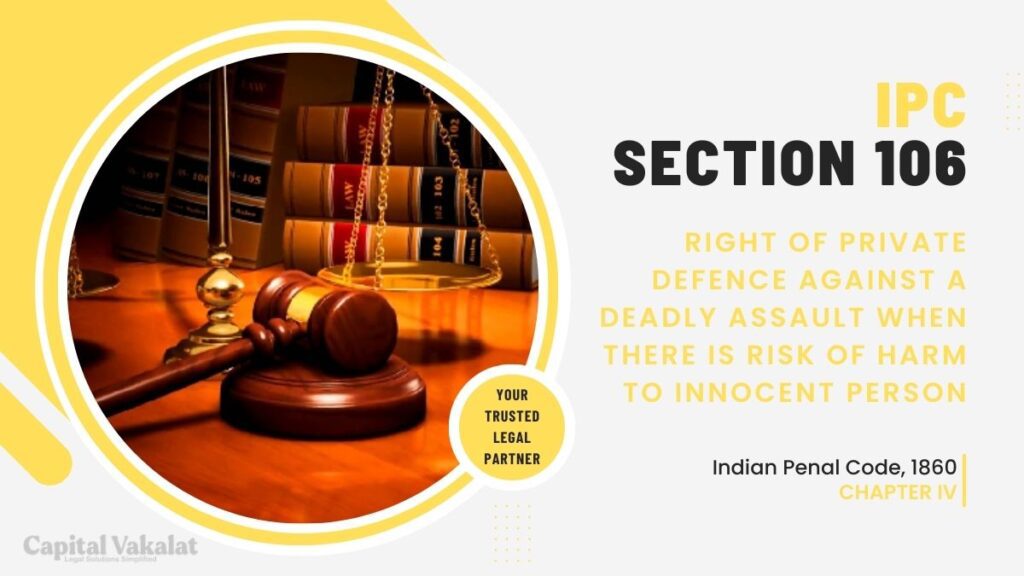In a world where personal safety is paramount, understanding the legal aspects of self-defense becomes crucial. Section 106 of the Indian Penal Code (IPC) addresses a specific scenario: the right of private defense against a deadly assault when there is a risk of harm to an innocent person.

This article delves into the intricacies of Section 106 IPC, shedding light on its provisions and implications.
Introduction to Section 106 IPC
Section 106 of the Indian Penal Code addresses a fundamental principle: the right of a person to defend themselves, even if it requires using force against an aggressor who poses a deadly threat. This provision recognizes the innate human instinct for self-preservation.
What Constitutes a Deadly Assault?
A deadly assault refers to an attack that has the potential to cause grievous bodily harm or even death. This could involve the use of weapons, extreme physical violence, or any action that poses an immediate risk to life.
The Doctrine of Reasonable Apprehension
To invoke the right of private defense, one must establish that there was a reasonable apprehension of imminent danger. This means that the threat must be real and perceived in a rational manner.
Proportional Force: A Key Principle
Section 106 IPC emphasizes the use of proportional force. In other words, the level of force used in self-defense should reasonably match the threat posed. Excessive force can lead to legal repercussions.
The Role of Imminence
The right of private defense hinges on the element of imminence. The threat should be immediate, leaving no room for deliberation or alternative actions.
Exercising the Right of Private Defense
Individuals can exercise this right only when there is no other option for self-preservation. It is a last resort measure to protect oneself or others from harm.
Limitations and Caution
While Section 106 IPC empowers individuals to defend themselves, it does not grant a license for vigilantism. The law expects people to act responsibly and ethically.
Legal Consequences of Excessive Force
Using excessive force in self-defense can lead to criminal charges. It’s essential to strike a balance between protecting oneself and not causing unnecessary harm.
Landmark Cases Interpreting Section 106 IPC
Several legal precedents have shaped the interpretation of Section 106 IPC. These cases provide insights into how the courts view the right of private defense.
Common Misconceptions
There are many misconceptions about self-defense laws. Clarifying these misconceptions can help individuals make informed decisions during critical moments.
Steps to Take when Faced with a Deadly Assault
In a situation where the right of private defense is invoked, there are specific steps one should consider taking to ensure their actions align with the law.
Seeking Legal Assistance
After a self-defense incident, it’s advisable to seek legal assistance to navigate the potential legal consequences and ensure one’s rights are protected.
Conclusion
Section 106 IPC serves as a vital legal provision, granting individuals the right to defend themselves and others when faced with a deadly assault. However, exercising this right comes with responsibilities and limitations, emphasizing the importance of using reasonable force and acting within the bounds of the law.
In conclusion, Section 106 IPC provides individuals with a legal framework to protect themselves and others when faced with a deadly assault. However, it is essential to exercise this right responsibly, using proportional force and seeking legal assistance when necessary. Understanding the provisions and limitations of this section is crucial for everyone concerned about personal safety and self-defense.
FAQs
What should I do if I am faced with a deadly assault?
You should first try to ensure your safety and that of others. If there’s no other option, you can use the right of private defense, but remember to use reasonable force.
Are there any situations where I cannot claim the right of private defense?
Yes, you cannot claim this right if there are other reasonable alternatives to protect yourself or others.
Can I defend someone else under Section 106 IPC?
Yes, you can use the right of private defense to protect others when they are faced with a deadly assault.
What should I do after defending myself using Section 106 IPC?
Seek legal assistance immediately to ensure that you have followed the law and to protect your rights.